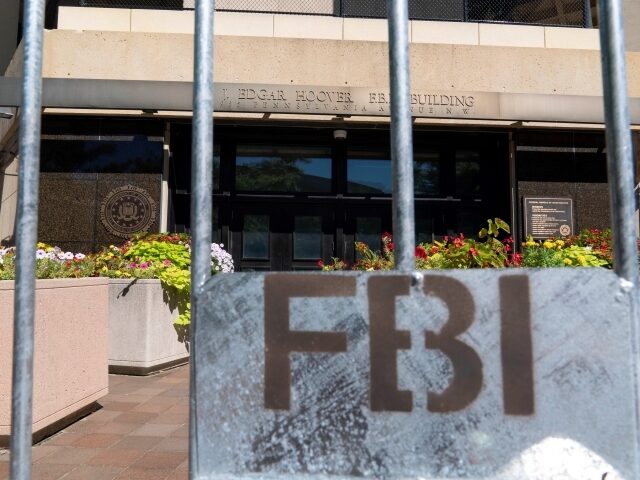By now, anyone with a political pulse knows about the Twitter Files. Thanks to their release, we have proof of what we long suspected: that the real collusion was between Big Tech and Big Government. And one of the leading chroniclers of this historic moment, Matt Taibbi, helps us tie up another loose end:
The takeaway: what most people think of as the “deep state” is really a tangled collaboration of state agencies, private contractors, and (sometimes state-funded) NGOs. The lines become so blurred as to be meaningless.
Ah yes, the Deep State, much written about here at Breitbart News. Back in late 2016, Breitbart News noticed that hidden forces in the federal government were mobilizing against Donald Trump, even before he was inaugurated as the 45th president. In a flurry of articles, this website chronicled the Deep State’s successful effort, for example, to take out Michael Flynn as Trump’s national security adviser.
At the time the establishment denied that there was any such thing as the Deep State. Nothing to see here—just patriotic civil servants doing their duty! Yet then, in November 2021, after Trump was safely gone from office, they fessed up; one Beltway establishmentarian published a book entitled—you guessed it!—American Resistance: The Inside Story of How the Deep State Saved the Nation. The book received admiring notices from—you guessed this one, too!—National Public Radio. Obviously, as they emerged from the gloom of Trump to the bright light of Biden, Deep Statists were happy to shift, from denying the plainly obvious to basking in liberal applause.
Yet as Taibbi documents, the Deep State is more than just lifer-bureaucrats in the Federal Triangle. It also includes sympathetic techsters, easily enlisted in the Deep State doings. And here, providing granular detail, the Twitter Files are invaluable. Another Twitter File scribe, Michael Shellenberger, notes that the FBI was so eager to get the company in on its game that it extended Top Secret security clearances to Twitter employees. Did you know that the FBI could do that? Indeed, the FBI gave Twitter $3.4 million to help with the suppressing, filtering, shadow-banning, and deplatforming. Did you know the FBI could do that?
Shellenberger further adds, “As of 2020, there were so many former FBI employees—‘Bu alumni’—working at Twitter that they had created their own private Slack channel and a crib sheet to onboard new FBI arrivals.”
Beyond career enhancement and networking for FBI alums, the big mission was discrediting the Hunter Biden laptop story. The FBI (the one headquartered in Washington) had gained possession of the laptop in late 2019, seizing it from the Delaware repair-shop owner. And while the Bureau obviously had no intention of telling anyone about the laptop prior to the election—indeed, two years after the election, we don’t even know for sure that the laptop even still exists—the FBI seems to have figured that there were copies of the laptop somewhere, perhaps due to surface prior to election day, 2020. And that would be bad for Joe Biden, and thus good for the dreaded Trump. So the FBI and its Deep State pals hatched a plan to preemptively declare the laptop’s contents to be a hoax, nothing but Russian disinformation.

Hunter Biden and his son Beau Biden, President Joe Biden’s grandson, arrive with the president and first lady Jill Biden at Nantucket Airport in Nantucket, Mass., Tuesday, Nov. 22, 2022. (AP Photo/Susan Walsh)
Shellenberger explains of the laptop-release strategizing, “The goal was to shape how the media covered it—and how social media carried it.” As Taibbi puts it, the relationship between the FBI and Twitter was “master-canine.” And journalist Lee Fang shows us part of the plan of preemption:
The Aspen Institute hosted reporters, media companies and social media firms in Sept. 2020 to prep for a possible Russian hack of Hunter Biden, one month before the NY Post story, at a time when the FBI had the laptop and had Giuliani under surveillance. Amazing coincidence.
Yes, it’s an amazing coincidence that the Deep State warned about a “fake news” laptop a month in advance. So when the laptop’s real contents were revealed by The New York Post on October 14, the pre-planned preemption was ready, and the story was kiboshed on Twitter. The woman who helped break the story at the Post, Emma-Jo Morris, recalls,
The closeness—and dare I say control—the FBI had with Twitter runs roughshod over the 1st, 4th, and 5th amendments. But the IC [Intelligence Community] isn’t the only one coming out of this reporting with a bruising. Or shouldn’t be.
Morris, who now works for Breitbart News, is blunt in spreading the blame on to Twitter: in her words, the company “employed a gang of spies leading up to the 2020 Election.” And Sen. Josh Hawley (R-MO), who has been an ace on this issue, adds, “Big Tech interfering in elections is bad enough. The FBI doing it is far, far worse.”
Writing in The American Conservative, Sumantra Maitra summed up Twitter’s role as a Deep State and Democratic enabler, which could yet lead to legal trouble for the enablers:
Twitter was connected deeply to the national security bureaucracy. It was led by extreme radicals with a hatred for any view even remotely conservative. The company interfered with elections. It was deeply censorious, a place where halfwit bureaucrats shadow-banned counterfactual analysis from a Stanford epidemiologists just because that analysis didn’t fit an approved narrative. In the name of social justice and equity, the company was a hotbed of trans and pedophilia activism. Twitter leadership lied to Congress, an offense punishable under law.
And iconoclast Glenn Greenwald adds, “When Dems controlled both houses of Congress and the WH (and Exec Branch), they repeatedly summoned Big Tech CEOs and openly and explicitly threatened them: if you don’t *censor more*, you will be punished. And DHS/FBI/CIA applied immense pressure.”
Of course, none of these transgressions will lead to trouble for either the Deep State or Twitter employees—most, if not all of them, by now ex-employees—unless there’s a law enforcement mechanism in place. The normal mechanism would be the U.S. Department of Justice, of which the FBI is a unit. And yet the same people who have sat on the Hunter laptop for the past three years are hardly likely to rouse themselves now. What are they supposed to do? Put themselves in jail?
Okay, so that’s the bad news: Nobody is going to get in serious legal trouble for machinations that might have well have tilted the 2020 election in Biden’s favor. At least no time soon. But there’s good news , too. And what’s that? We’ve all learned a lot. Thanks to the Twitter Files–which keep coming–we’ve seen inside the belly of the beast, and we know that we’re not paranoid–we really do have enemies, in very high places. The Deep State is real. We’ve seen it and its workings. That’s knowledge we can take with us: into 2024 and beyond. And as they say, knowledge is power.
Yet in the meantime, what tools do we have to to enforce accountability? All that remains now is Congressional oversight: the power of the Legislative Branch to demand that the Executive Branch do its job. (That job doesn’t properly include protecting Joe Biden.)
Fortunately, the Republicans won the House last year, and so they will have oversight power in that chamber in the 118th Congress. To be sure, this oversight power is contingent on the GOP’s ability to actually elect a Speaker to replace Nancy Pelosi. That’s a likely thing, but not, alas, a sure thing.
But assuming that House Republicans do get their act together for the new Congress and assert their majority, the GOP will still have to split its oversight power with the Democrats, who retained the Senate in the midterms, thank to some issues regarding candidate quality. And the Democrats will not be any more interested in pursuing Hunter Biden, the FBI, or Deep State in the future than they have been in the past.

Rep. Kevin McCarthy, R-Calif., reacts after winning the 15th vote in the House chamber as the House enters the fifth day trying to elect a speaker and convene the 118th Congress in Washington, early Saturday, Jan. 7, 2023. (AP Photo/Alex Brandon)
Yet even if Republicans control only half the Congress, they are rarin’ to go, and that could be worth a lot. Reps. Jim Jordan of Ohio and James Comer of Kentucky are now taking over the chairmanships of the Judiciary and Oversight Committees, respectively, and they are both determined to expose Twitter, Big Tech, and the Deep State, even as more revelations keep surfacing. For instance, just on January 3, as all eyes were on the speakership election drama in the House, Taibbi showed the world how Sen. Mark Warner (D-VA) maneuvered to get the MSM and the Deep State to pressure Twitter management to “show” how the Russians were running a big pro-Donald Trump ring on Twitter in the presidential election. (They weren’t.)
Jordan’s deft and fact-based exposing of ex-conservative Rob Schenck at a December 11 Judiciary Committee hearing gives conservatives hope that a lot more exposing will come. (If Jordan can do that from the mostly powerless minority, imagine what he can do as majority chairman, wielding subpoena power.) And for his part, Comer told Fox Business on December 20 that he will seek to put a hold on FBI funding until they “come down here” and “explain.” Indeed, Republicans have said they want to see a “Church-style investigation” of the FBI and CIA, referring to the extensive Congressional investigation of those agencies led by Sen. Frank Church of Idaho back in the 1970s. Interestingly, Elon Musk, Twitter’s new owner–and the man who ultimately deserves credit for the release of the Twitter Files–has endorsed the idea of a full Congressional investigation.
Admittedly, no matter how hard they try, Jordan, Comer, and other GOP diggers can’t do much more than shine a light on the problem–in the short run. Hearings can set the agenda, as Americans discuss this three-way between the Democrats, the Deep State and Big Tech. (And, as Breitbart News has further reported, the federal government, including ex-government employees, has insinuated itself into virtually every big tech company.)
The real movement in exposing, and perhaps undoing, this cronyism will come if and when Republicans win back the White House–Donald Trump, to name the only announced 2024 GOP aspirant, has made “dismantling the Deep State” a prime objective– and investigate the DOJ, the FBI, Big Tech, and all the rest from a position of real power.
Until then, the Deep State lives. And thrives.

COMMENTS
Please let us know if you're having issues with commenting.